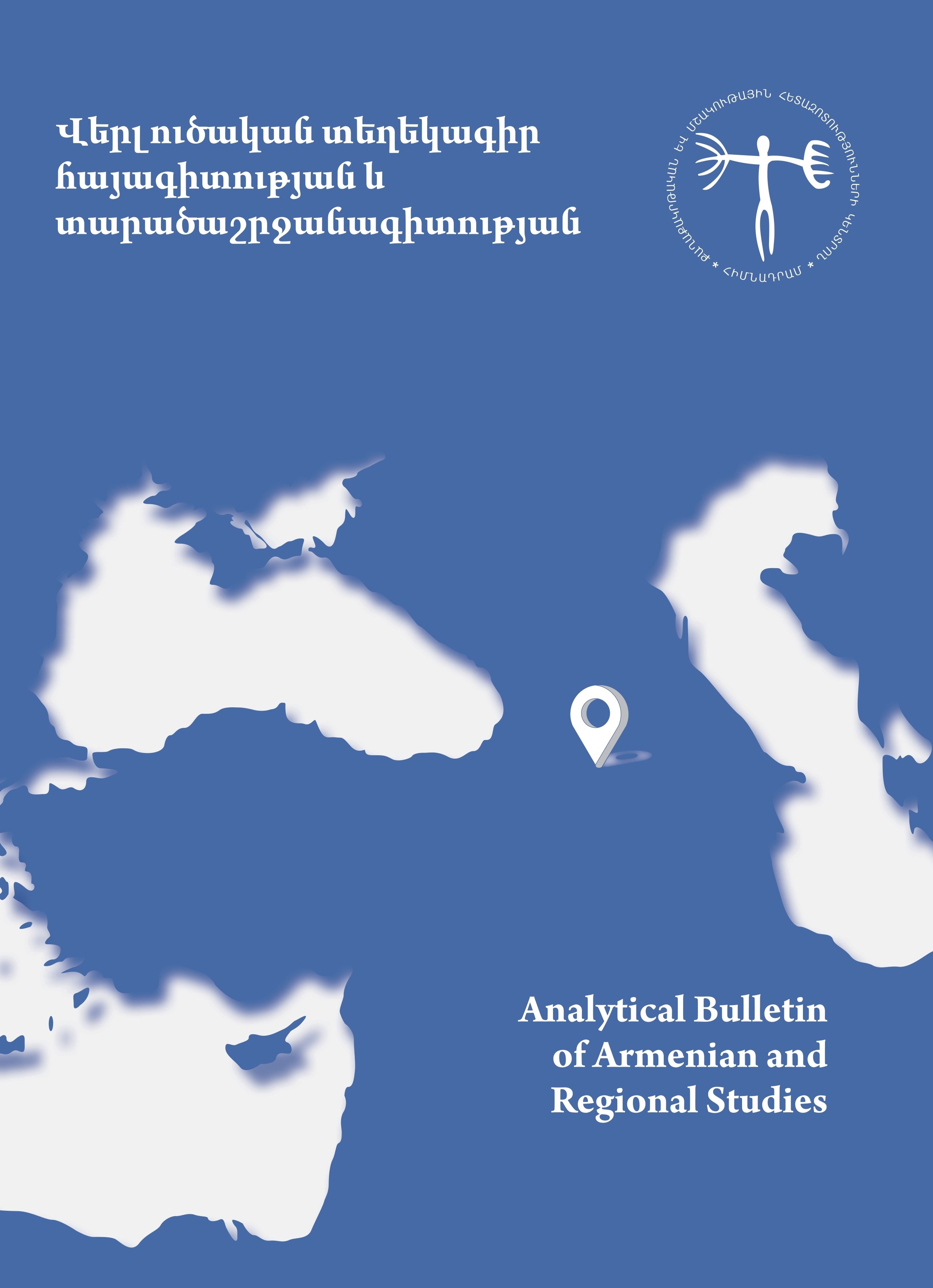U.S. Foreign Policy under President Trump: The Middle East, Eastern Mediterranean and Black Sea Regions
DOI:
https://doi.org/10.56673/18294502-22.14-17Abstract
The current phase in international relations can be best characterized by one word – transition. The Post-Cold War order is rapidly disappearing, creating strategic ambiguity for all actors. The U.S. hegemony is over or close to over despite the fact that militarily Washington will be safely far out of reach for several decades to come. However, the growing national debt, the looming crisis in the Social Security and Medicare systems, uncontrolled migration, growing populism and partisan fighting does not bode well for the future of U.S. dominance. At the same time, no nation, be it China, Russia, India or Brazil, has the necessary resources or will to compete for the new world hegemony.The absence of a world hegemon means that no state has the power to enforce the implementation of key international rules and norms. Regardless how one perceives the international principles – as balanced or biased – the rule-based order at least provides a minimal level of stability since the actors involved on the international stage have a clear understanding what may and may not be done. However, since the late 2000s the situation has changed. We are increasingly facing an international security architecture where key actors may easily break the norms and rules, and this will eventually bring us to a situation upon which no rules can be based.
The election of President Trump sent shock waves through the United States’ political establishment and surprised international relations pundits worldwide. Despite the apparent growth of the right-wing populist movements in different parts of the world, the culmination of which was presumably the BREXIT referendum held in June 2016, few if any could imagine that a real estate developer and reality TV star had any chance of defeating one of the most respected representatives of the US political establishment. The November 2016 elections had widespread implications on both American domestic and foreign policies.
President Trump’s decision to denounce globalism created a situation where the so-called “vertical globalism” (Western-led efforts to spread a liberal international order all over the world through the promotion of democracy and a market economy) might be transformed into a “horizontal globalism” based on regional integration models covering vast territories of Europe and Asia, Africa and Latin America.
In this paper we will analyze President Trump’s foreign policy in several key geographical areas and its implications. However, in order to better understand the significant changes in U.S. foreign policy ushered in by President Trump and make predictions for future developments, it is worth starting with an examination of Trump’s foreign policy perceptions as well as of the ongoing debates within the foreign policy establishment itself.
References
Zbigniew Brzezinski, The Grand Chessboard: American Primacy and its Geostrategic Imperatives (Basic Books, 1997)
Stephen Wertheim, “The Price of Primacy,” Foreign Affairs, March–April 2020, https://www.foreignaffairs.com/articles/afghanistan/2020-02-10/price-primacy
“A National Security Strategy of Engagement and Enlargement,” https://history.defense.gov/Portals/70/Documents/nss/nss1994.pdf?ver=2014-06-25-121219-500
“The National Security Strategy of the United States of America,” two versions: September 2002 and March 2006, https://history.defense.gov/Portals/70/Documents/nss/nss2002.pdf?ver=2014-06-25-121337-027 and https://history.defense.gov/Portals/70/Documents/nss/nss2006.pdf?ver=2014-06-25-121325-543
Hillary Clinton, “America’s Pacific Century,” Foreign Policy, October 2011, https://foreignpolicy.com/2011/10/11/americas-pacific-century/
“European Deterrence Initiative,” Office of the Under Secretary of Defense (Comptroller), February 2020, https://comptroller.defense.gov/Portals/45/Documents/defbudget/fy2021/fy2021_EDI_JBook.pdf
Christopher Layne, “From Preponderance to Offshore Balancing: America's Future Grand Strategy,” International Security 22, no. 1 (Summer 1997): 86-124, https://calhoun.nps.edu/bitstream/handle/10945/43144/Layne_Christopher_From_Preponderance_1997.pdf?sequence=1&isAllowed=y
Christopher Layne, “Offshore balancing revisited,” The Washington Quarterly 25 no. 2 (2002): 233-248, https://doi.org/10.1162/01636600252820252
Stephen Walt and John Mearsheimer, “The Case for Offshore Balancing: A Superior U.S. Grand Strategy,” Foreign Affairs, July/August 2016, https://www.foreignaffairs.com/articles/united-states/2016-06-13/case-offshore-balancing
“EU mechanism for trade with Iran 'now operational’,” DW.com, https://www.dw.com/en/eu-mechanism-for-trade-with-iran-now-operational/a-49407662, last accessed 23 July 2022
Muhammet Kursun, “Iran: Conservatives win majority of seats in parliament,” Anadolu Agency, 23 February 2020, https://www.aa.com.tr/en/world/iran-conservatives-winmajority-of-seats-in-parliament/1741989
Stephen Blank, “Is rapprochement with Turkey possible?” MEI@75, 15 May 2020, https://www.mei.edu/publications/rapprochement-turkey-possible
Diego Cupulo, “Delayed S-400 activation could offer chance for Turkey-US ties to warm,” Al-Monitor, 21 April 2020, https://www.al-monitor.com/pulse/originals/2020/04/s400-delay-us-turkey-window-opportunity.html#ixzz6QIAIafIk
Angeliki Koutantou, “Greece, Israel, Cyprus sign EastMed gas pipeline deal,” Reuters, 2 January 2020, https://www.reuters.com/article/us-greece-cyprus-israel-pipeline/greeceisrael-cyprus-sign-eastmed-gas-pipeline-deal-idUSKBN1Z10R5
George Mikhail, “Egypt announces international anti-Turkey alliance,” Al-Monitor, 25 May 2020, https://www.al-monitor.com/pulse/originals/2020/05/egypt-anti-turkey-alliancelibya-mediterranean-waters.html
Elena Becatoros, “Greece, Cyprus, Israel, US pledge to boost energy cooperation,” The Times of Israel, 7 August 2019, https://www.timesofisrael.com/greece-cyprus-israel-uspledge-to-boost-energy-cooperation/
“NATO’s military presence in the east of the Alliance,” NATO, https://www.nato.int/cps/en/natohq/topics_136388.htm, last accessed 23 July 2022
Wiktor Możgin, “The Three Seas Initiative – An aspect of contemporary geopolitical competition for dominance in Europe, Ante Portas 2(13) (2019): 45-60, http://anteportas.pl/wp-content/uploads/2020/05/AP.XIII_Mozgin.pdf
Downloads
Published
How to Cite
Issue
Section
License
Copyright (c) 2022 Benyamin Poghosyan

This work is licensed under a Creative Commons Attribution-NonCommercial 4.0 International License.









